Linux环境PHP7.0安装
Posted 爱你爱自己
tags:
篇首语:本文由小常识网(cha138.com)小编为大家整理,主要介绍了Linux环境PHP7.0安装相关的知识,希望对你有一定的参考价值。
PHP7和HHVM比较
php7的在真实场景的性能确实已经和HHVM相当, 在一些场景甚至超过了HHVM。HHVM的运维复杂, 是多线程模型, 这就代表着如果一个线程导致crash了, 那么整个服务就挂了, 并且它不会自动重启。另外它采用JIT, 那么意味着, 重启以后要预热, 没有预热的情况下, 性能较为糟糕。并且多线程模型调试困难, 这对于追求稳定来说的Web服务来说, 是非常不适合的。
nginx以及PHP7.0之前的版本可以参考此文:Linux环境Nginx安装与调试以及PHP安装
PHP7.0正式版已经在2015年11月份左右发布,目前是PHP7.0.2版本,本人最早是从2015年8月php7的第一个测试版跟起,现在正式版发布。
linux版本:64位CentOS 6.6
Nginx版本:nginx1.8.0
php版本:php-7.0.2
下载
# wget http://php.net/get/php-7.0.2.tar.gz/from/a/mirror
--with-curl \
--with-freetype-dir \
--with-gd \
--with-gettext \
--with-iconv-dir \
--with-kerberos \
--with-libdir=lib64 \
--with-libxml-dir \
--with-mysqli \
--with-openssl \
--with-pcre-regex \
--with-pdo-mysql \
--with-pdo-sqlite \
--with-pear \
--with-png-dir \
--with-xmlrpc \
--with-xsl \
--with-zlib \
--enable-fpm \
--enable-bcmath \
--enable-libxml \
--enable-inline-optimization \
--enable-gd-native-ttf \
--enable-mbregex \
--enable-mbstring \
--enable-opcache \
--enable-pcntl \
--enable-shmop \
--enable-soap \
--enable-sockets \
--enable-sysvsem \
--enable-xml \
--enable-zip
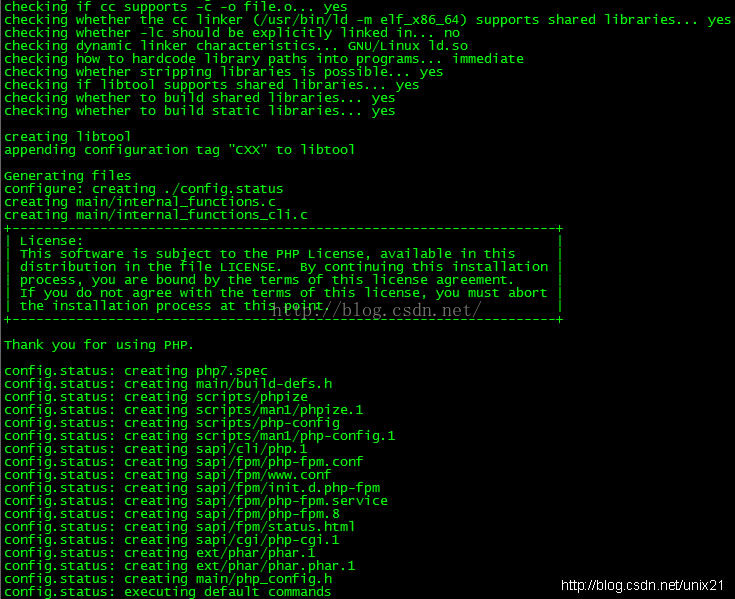
如果配置错误,需要安装需要的模块,直接yum一并安装依赖库
# yum -y install libjpeg libjpeg-devel libpng libpng-devel freetype freetype-devel libxml2 libxml2-devel mysql pcre-devel
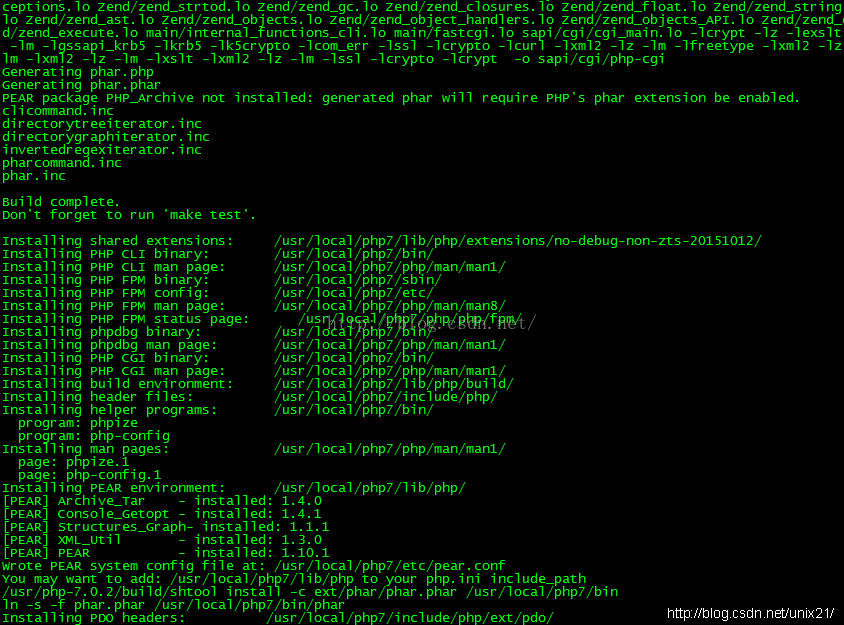
# cp /usr/local/php/etc/php-fpm.d/www.conf.default /usr/local/php/etc/php-fpm.d/www.conf
# /etc/init.d/php-fpm
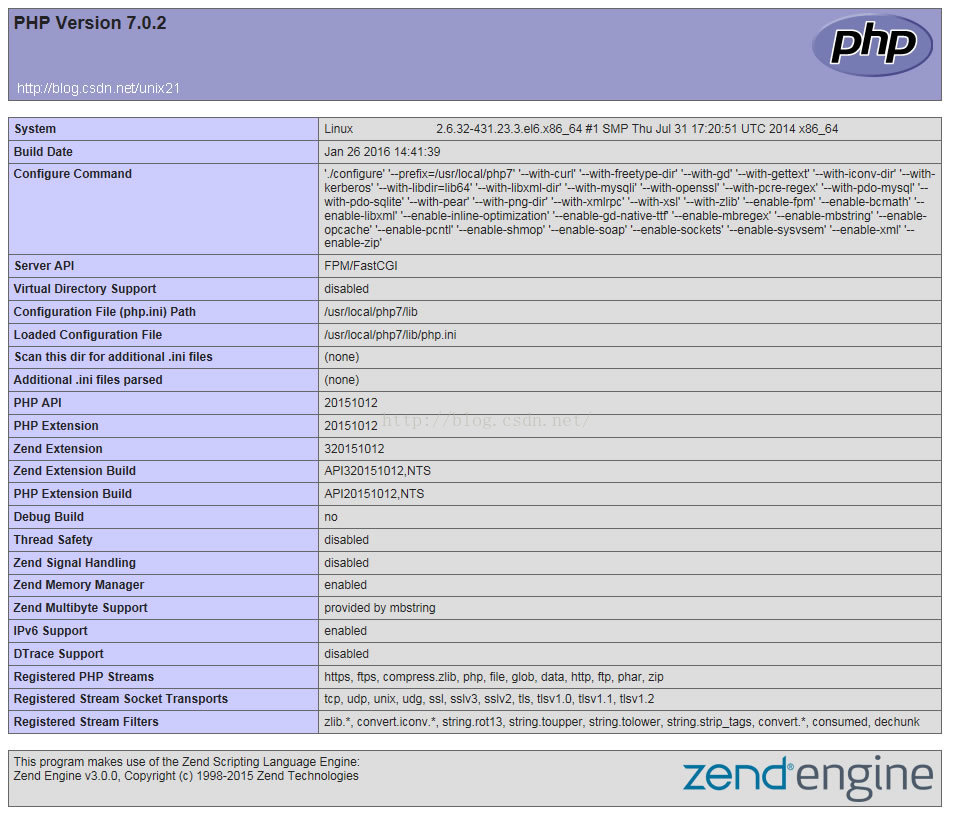
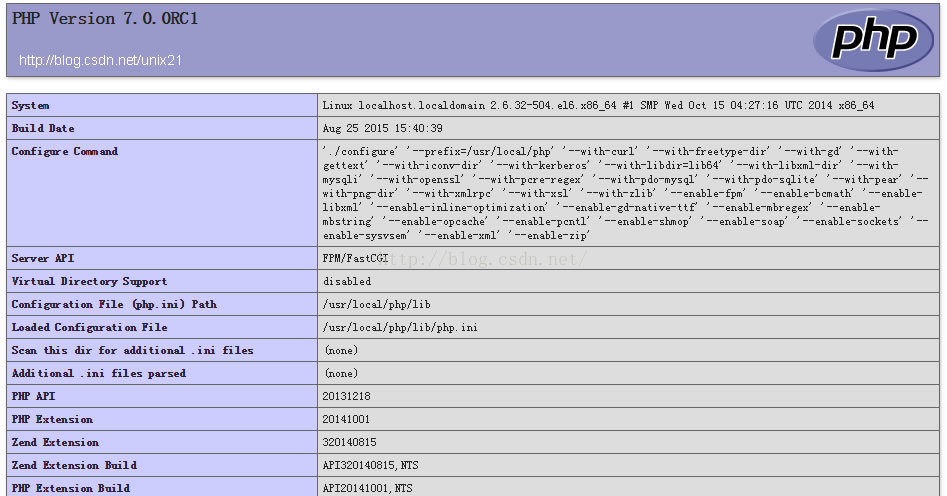
- <?php
- //time /usr/local/php5/bin/php search_by_key.php
- $a = array();
- for($i=0;$i<600000;$i++){
- $a[$i] = $i;
- }
- foreach($a as $i)
- {
- array_key_exists($i, $a);
- }
- ?>
[[email protected] www5.4.44]# time /usr/local/php5.4.44/bin/php search_by_key.php
real 0m0.351s
user 0m0.300s
sys 0m0.050s
PHP 5.5.28 版
[[email protected] www]# time /usr/local/php/bin/php search_by_key.php
real 0m0.361s
user 0m0.304s
sys 0m0.057s
PHP 7.0.0 版
[[email protected] www7]# time /usr/local/php7/bin/php search_by_key.php
real 0m0.114s
user 0m0.097s
sys 0m0.017s
官网地址:http://php.net/opcache
使用下列推荐设置来获得较好的 性能:
opcache.memory_consumption=128 opcache.interned_strings_buffer=8 opcache.max_accelerated_files=4000 opcache.revalidate_freq=60 opcache.fast_shutdown=1 opcache.enable_cli=1
你也可以禁用 opcache.save_comments 并且启用 opcache.enable_file_override。 需要提醒的是,在生产环境中使用上述配置之前,必须经过严格测试。 因为上述配置存在一个已知问题,它会引发一些框架和应用的异常, 尤其是在存在文档使用了备注注解的时候。
# 加入
zend_extension=/usr/local/php7/lib/php/extensions/no-debug-non-zts-20141001/opcache.so
重启
# killall php-fpm
# /etc/init.d/php-fpm
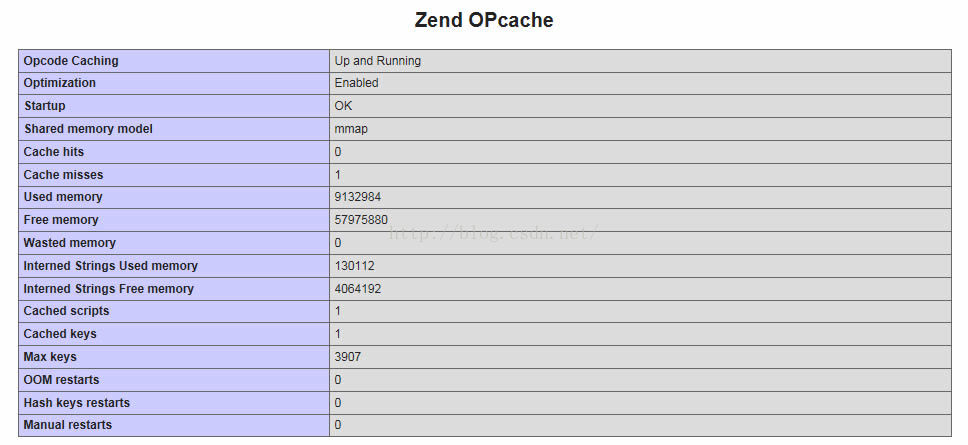
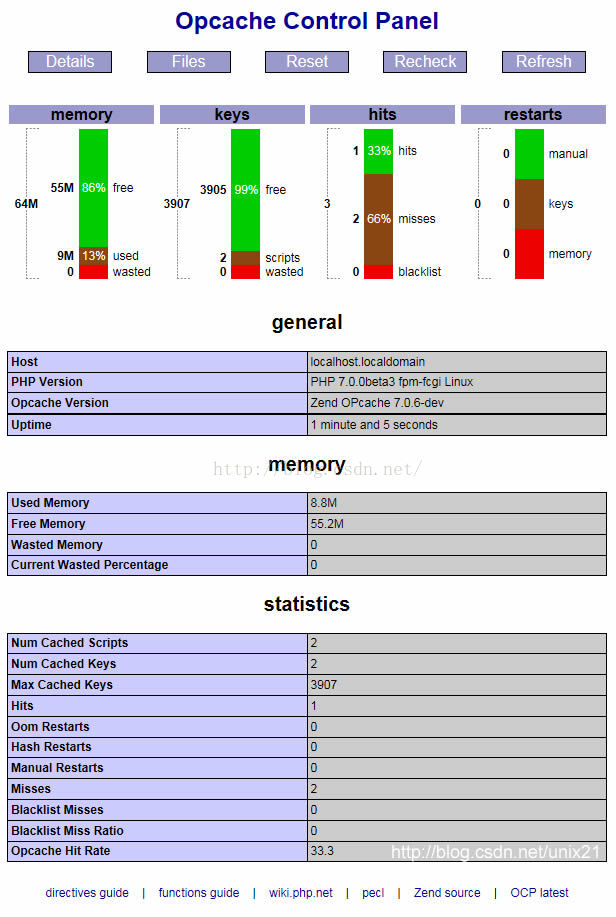
- <?php
- /*
- OCP - Opcache Control Panel (aka Zend Optimizer+ Control Panel for PHP)
- Author: _ck_ (with contributions by GK, stasilok)
- Version: 0.1.6
- Free for any kind of use or modification, I am not responsible for anything, please share your improvements
- * revision history
- 0.1.6 2013-04-12 moved meta to footer so graphs can be higher and reduce clutter
- 0.1.5 2013-04-12 added graphs to visualize cache state, please report any browser/style bugs
- 0.1.4 2013-04-09 added "recheck" to update files when using large revalidate_freq (or validate_timestamps=Off)
- 0.1.3 2013-03-30 show host and php version, can bookmark with hashtag ie. #statistics - needs new layout asap
- 0.1.2 2013-03-25 show optimization levels, number formatting, support for start_time in 7.0.2
- 0.1.1 2013-03-18 today Zend completely renamed Optimizer+ to OPcache, adjusted OCP to keep working
- 0.1.0 2013-03-17 added group/sort indicators, replaced "accelerator_" functions with "opcache_"
- 0.0.6 2013-03-16 transition support as Zend renames product and functions for PHP 5.5 (stasilok)
- 0.0.5 2013-03-10 added refresh button (GK)
- 0.0.4 2013-02-18 added file grouping and sorting (click on headers) - code needs cleanup but gets the job done
- 0.0.2 2013-02-14 first public release
- * known problems/limitations:
- Unlike APC, the Zend OPcache API
- - cannot determine when a file was put into the cache
- - cannot change settings on the fly
- - cannot protect opcache functions by restricting execution to only specific scripts/paths
- * todo:
- Extract variables for prefered ordering and better layout instead of just dumping into tables
- File list filter
- */
- // ini_set(‘display_errors‘,1); error_reporting(-1);
- if ( count(get_included_files())>1 || php_sapi_name()==‘cli‘ || empty($_SERVER[‘REMOTE_ADDR‘]) ) { die; } // weak block against indirect access
- $time=time();
- define(‘CACHEPREFIX‘,function_exists(‘opcache_reset‘)?‘opcache_‘:(function_exists(‘accelerator_reset‘)?‘accelerator_‘:‘‘));
- if ( !empty($_GET[‘RESET‘]) ) {
- if ( function_exists(CACHEPREFIX.‘reset‘) ) { call_user_func(CACHEPREFIX.‘reset‘); }
- header( ‘Location: ‘.str_replace(‘?‘.$_SERVER[‘QUERY_STRING‘],‘‘,$_SERVER[‘REQUEST_URI‘]) );
- exit;
- }
- if ( !empty($_GET[‘RECHECK‘]) ) {
- if ( function_exists(CACHEPREFIX.‘invalidate‘) ) {
- $recheck=trim($_GET[‘RECHECK‘]); $files=call_user_func(CACHEPREFIX.‘get_status‘);
- if (!empty($files[‘scripts‘])) {
- foreach ($files[‘scripts‘] as $file=>$value) {
- if ( $recheck===‘1‘ || strpos($file,$recheck)===0 ) call_user_func(CACHEPREFIX.‘invalidate‘,$file);
- }
- }
- header( ‘Location: ‘.str_replace(‘?‘.$_SERVER[‘QUERY_STRING‘],‘‘,$_SERVER[‘REQUEST_URI‘]) );
- } else { echo ‘Sorry, this feature requires Zend Opcache newer than April 8th 2013‘; }
- exit;
- }
- ?><!DOCTYPE html>
- <html>
- <head>
- <title>OCP - Opcache Control Panel</title>
- <meta name="ROBOTS" content="NOINDEX,NOFOLLOW,NOARCHIVE" />
- <style type="text/css">
- body {background-color: #fff; color: #000;}
- body, td, th, h1, h2 {font-family: sans-serif;}
- pre {margin: 0px; font-family: monospace;}
- a:link,a:visited {color: #000099; text-decoration: none;}
- a:hover {text-decoration: underline;}
- table {border-collapse: collapse; width: 600px; }
- .center {text-align: center;}
- .center table { margin-left: auto; margin-right: auto; text-align: left;}
- .center th { text-align: center !important; }
- .middle {vertical-align:middle;}
- td, th { border: 1px solid #000; font-size: 75%; vertical-align: baseline; padding: 3px; }
- h1 {font-size: 150%;}
- h2 {font-size: 125%;}
- .p {text-align: left;}
- .e {background-color: #ccccff; font-weight: bold; color: #000; width:50%; white-space:nowrap;}
- .h {background-color: #9999cc; font-weight: bold; color: #000;}
- .v {background-color: #cccccc; color: #000;}
- .vr {background-color: #cccccc; text-align: right; color: #000; white-space: nowrap;}
- .b {font-weight:bold;}
- .white, .white a {color:#fff;}
- img {float: right; border: 0px;}
- hr {width: 600px; background-color: #cccccc; border: 0px; height: 1px; color: #000;}
- .meta, .small {font-size: 75%; }
- .meta {margin: 2em 0;}
- .meta a, th a {padding: 10px; white-space:nowrap; }
- .buttons {margin:0 0 1em;}
- .buttons a {margin:0 15px; background-color: #9999cc; color:#fff; text-decoration:none; padding:1px; border:1px solid #000; display:inline-block; width:5em; text-align:center;}
- #files td.v a {font-weight:bold; color:#9999cc; margin:0 10px 0 5px; text-decoration:none; font-size:120%;}
- #files td.v a:hover {font-weight:bold; color:#ee0000;}
- .graph {display:inline-block; width:145px; margin:1em 0 1em 1px; border:0; vertical-align:top;}
- .graph table {width:100%; height:150px; border:0; padding:0; margin:5px 0 0 0; position:relative;}
- .graph td {vertical-align:middle; border:0; padding:0 0 0 5px;}
- .graph .bar {width:25px; text-align:right; padding:0 2px; color:#fff;}
- .graph .total {width:34px; text-align:center; padding:0 5px 0 0;}
- .graph .total div {border:1px dashed #888; border-right:0; height:99%; width:12px; position:absolute; bottom:0; left:17px; z-index:-1;}
- .graph .total span {background:#fff; font-weight:bold;}
- .graph .actual {text-align:right; font-weight:bold; padding:0 5px 0 0;}
- .graph .red {background:#ee0000;}
- .graph .green {background:#00cc00;}
- .graph .brown {background:#8B4513;}
- </style>
- <!--[if lt IE 9]><script type="text/javascript" defer="defer">
- window.onload=function(){var i,t=document.getElementsByTagName(‘table‘);for(i=0;i<t.length;i++){if(t[i].parentNode.className==‘graph‘)t[i].style.height=150-(t[i].clientHeight-150)+‘px‘;}}
- </script><![endif]-->
- </head>
- <body>
- <div class="center">
- <h1><a href="?">Opcache Control Panel</a></h1>
- <div class="buttons">
- <a href="?ALL=1">Details</a>
- <a href="?FILES=1&GROUP=2&SORT=3">Files</a>
- <a href="?RESET=1" onclick="return confirm(‘RESET cache ?‘)">Reset</a>
- <?php if ( function_exists(CACHEPREFIX.‘invalidate‘) ) { ?>
- <a href="?RECHECK=1" onclick="return confirm(‘Recheck all files in the cache ?‘)">Recheck</a>
- <?php } ?>
- <a href="?" onclick="window.location.reload(true); return false">Refresh</a>
- </div>
- <?php
- if ( !function_exists(CACHEPREFIX.‘get_status‘) ) { echo ‘<h2>Opcache not detected?</h2>‘; die; }
- if ( !empty($_GET[‘FILES‘]) ) { echo ‘<h2>files cached</h2>‘; files_display(); echo ‘</div></body></html>‘; exit; }
- if ( !(isset($_REQUEST[‘GRAPHS‘]) && !$_REQUEST[‘GRAPHS‘]) && CACHEPREFIX==‘opcache_‘) { graphs_display(); if ( !empty($_REQUEST[‘GRAPHS‘]) ) { exit; } }
- ob_start(); phpinfo(8); $phpinfo = ob_get_contents(); ob_end_clean(); // some info is only available via phpinfo? sadly buffering capture has to be used
- if ( !preg_match( ‘/module\_Zend (Optimizer\+|OPcache).+?(\<table[^>]*\>.+?\<\/table\>).+?(\<table[^>]*\>.+?\<\/table\>)/s‘, $phpinfo, $opcache) ) { } // todo
- if ( function_exists(CACHEPREFIX.‘get_configuration‘) ) { echo ‘<h2>general</h2>‘; $configuration=call_user_func(CACHEPREFIX.‘get_configuration‘); }
- $host=function_exists(‘gethostname‘)[email protected]():@php_uname(‘n‘); if (empty($host)) { $host=empty($_SERVER[‘SERVER_NAME‘])?$_SERVER[‘HOST_NAME‘]:$_SERVER[‘SERVER_NAME‘]; }
- $version=array(‘Host‘=>$host);
- $version[‘PHP Version‘]=‘PHP ‘.(defined(‘PHP_VERSION‘)?PHP_VERSION:‘???‘).‘ ‘.(defined(‘PHP_SAPI‘)?PHP_SAPI:‘‘).‘ ‘.(defined(‘PHP_OS‘)?‘ ‘.PHP_OS:‘‘);
- $version[‘Opcache Version‘]=empty($configuration[‘version‘][‘version‘])?‘???‘:$configuration[‘version‘][CACHEPREFIX.‘product_name‘].‘ ‘.$configuration[‘version‘][‘version‘];
- print_table($version);
- if ( !empty($opcache[2]) ) { echo preg_replace(‘/\<tr\>\<td class\="e"\>[^>]+\<\/td\>\<td class\="v"\>[0-9\,\. ]+\<\/td\>\<\/tr\>/‘,‘‘,$opcache[2]); }
- if ( function_exists(CACHEPREFIX.‘get_status‘) && $status=call_user_func(CACHEPREFIX.‘get_status‘) ) {
- $uptime=array();
- if ( !empty($status[CACHEPREFIX.‘statistics‘][‘start_time‘]) ) {
- $uptime[‘uptime‘]=time_since($time,$status[CACHEPREFIX.‘statistics‘][‘start_time‘],1,‘‘);
- }
- if ( !empty($status[CACHEPREFIX.‘statistics‘][‘last_restart_time‘]) ) {
- $uptime[‘last_restart‘]=time_since($time,$status[CACHEPREFIX.‘statistics‘][‘last_restart_time‘]);
- }
- if (!empty($uptime)) {print_table($uptime);}
- if ( !empty($status[‘cache_full‘]) ) { $status[‘memory_usage‘][‘cache_full‘]=$status[‘cache_full‘]; }
- echo ‘<h2 id="memory">memory</h2>‘;
- print_table($status[‘memory_usage‘]);
- unset($status[CACHEPREFIX.‘statistics‘][‘start_time‘],$status[CACHEPREFIX.‘statistics‘][‘last_restart_time‘]);
- echo ‘<h2 id="statistics">statistics</h2>‘;
- print_table($status[CACHEPREFIX.‘statistics‘]);
- }
- if ( empty($_GET[‘ALL‘]) ) { meta_display(); exit; }
- if ( !empty($configuration[‘blacklist‘]) ) { echo ‘<h2 id="blacklist">blacklist</h2>‘; print_table($configuration[‘blacklist‘]); }
- if ( !empty($opcache[3]) ) { echo ‘<h2 id="runtime">runtime</h2>‘; echo $opcache[3]; }
- $name=‘zend opcache‘; $functions=get_extension_funcs($name);
- if (!$functions) { $name=‘zend optimizer+‘; $functions=get_extension_funcs($name); }
- if ($functions) { echo ‘<h2 id="functions">functions</h2>‘; print_table($functions); } else { $name=‘‘; }
- $level=trim(CACHEPREFIX,‘_‘).‘.optimization_level‘;
- if (isset($configuration[‘directives‘][$level])) {
- echo ‘<h2 id="optimization">optimization levels</h2>‘;
- $levelset=strrev(base_convert($configuration[‘directives‘][$level], 10, 2));
- $levels=array(
- 1=>‘<a href="http://wikipedia.org/wiki/Common_subexpression_elimination">Constants subexpressions elimination</a> (CSE) true, false, null, etc.<br />Optimize series of ADD_STRING / ADD_CHAR<br />Convert CAST(IS_BOOL,x) into BOOL(x)<br />Convert <a href="http://www.php.net/manual/internals2.opcodes.init-fcall-by-name.php">INIT_FCALL_BY_NAME</a> + <a href="http://www.php.net/manual/internals2.opcodes.do-fcall-by-name.php">DO_FCALL_BY_NAME</a> into <a href="http://www.php.net/manual/internals2.opcodes.do-fcall.php">DO_FCALL</a>‘,
- 2=>‘Convert constant operands to expected types<br />Convert conditional <a href="http://php.net/manual/internals2.opcodes.jmp.php">JMP</a> with constant operands<br />Optimize static <a href="http://php.net/manual/internals2.opcodes.brk.php">BRK</a> and <a href="<a href="http://php.net/manual/internals2.opcodes.cont.php">CONT</a>‘,
- 3=>‘Convert $a = $a + expr into $a += expr<br />Convert $a++ into ++$a<br />Optimize series of <a href="http://php.net/manual/internals2.opcodes.jmp.php">JMP</a>‘,
- 4=>‘PRINT and ECHO optimization (<a href="https://github.com/zend-dev/ZendOptimizerPlus/issues/73">defunct</a>)‘,
- 5=>‘Block Optimization - most expensive pass<br />Performs many different optimization patterns based on <a href="http://wikipedia.org/wiki/Control_flow_graph">control flow graph</a> (CFG)‘,
- 9=>‘Optimize <a href="http://wikipedia.org/wiki/Register_allocation">register allocation</a> (allows re-usage of temporary variables)‘,
- 10=>‘Remove NOPs‘
- );
- echo ‘<table width="600" border="0" cellpadding="3"><tbody><tr class="h"><th>Pass</th><th>Description</th></tr>‘;
- foreach ($levels as $pass=>$description) {
- $disabled=substr($levelset,$pass-1,1)!==‘1‘ || $pass==4 ? ‘ white‘:‘‘;
- echo ‘<tr><td class="v center middle‘.$disabled.‘">‘.$pass.‘</td><td class="v‘.$disabled.‘">‘.$description.‘</td></tr>‘;
- }
- echo ‘</table>‘;
- }
- if ( isset($_GET[‘DUMP‘]) ) {
- if ($name) { echo ‘<h2 id="ini">ini</h2>‘; print_table(ini_get_all($name,true)); }
- foreach ($configuration as $key=>$value) { echo ‘<h2>‘,$key,‘</h2>‘; print_table($configuration[$key]); }
- exit;
- }
- meta_display();
- echo ‘</div></body></html>‘;
- exit;
- function time_since($time,$original,$extended=0,$text=‘ago‘) {
- $time = $time - $original;
- $day = $extended? floor($time/86400) : round($time/86400,0);
- $amount=0; $unit=‘‘;
- if ( $time < 86400) {
- if ( $time < 60) { $amount=$time; $unit=‘second‘; }
- elseif ( $time < 3600) { $amount=floor($time/60); $unit=‘minute‘; }
- else { $amount=floor($time/3600); $unit=‘hour‘; }
- }
- elseif ( $day < 14) { $amount=$day; $unit=‘day‘; }
- elseif ( $day < 56) { $amount=floor($day/7); $unit=‘week‘; }
- elseif ( $day < 672) { $amount=floor($day/30); $unit=‘month‘; }
- else { $amount=intval(2*($day/365))/2; $unit=‘year‘; }
- if ( $amount!=1) {$unit.=‘s‘;}
- if ($extended && $time>60) { $text=‘ and ‘.time_since($time,$time<86400?($time<3600?$amount*60:$amount*3600):$day*86400,0,‘‘).$text; }
- return $amount.‘ ‘.$unit.‘ ‘.$text;
- }
- function print_table($array,$headers=false) {
- if ( empty($array) || !is_array($array) ) {return;}
- echo ‘<table border="0" cellpadding="3" width="600">‘;
- if (!empty($headers)) {
- if (!is_array($headers)) {$headers=array_keys(reset($array));}
- echo ‘<tr class="h">‘;
- foreach ($headers as $value) { echo ‘<th>‘,$value,‘</th>‘; }
- echo ‘</tr>‘;
- }
- foreach ($array as $key=>$value) {
- echo ‘<tr>‘;
- if ( !is_numeric($key) ) {
- $key=ucwords(str_replace(‘_‘,‘ ‘,$key));
- echo ‘<td class="e">‘,$key,‘</td>‘;
- if ( is_numeric($value) ) {
- if ( $value>1048576) { $value=round($value/1048576,1).‘M‘; }
- elseif ( is_float($value) ) { $value=round($value,1); }
- }
- }
- if ( is_array($value) ) {
- foreach ($value as $column) {
- echo ‘<td class="v">‘,$column,‘</td>‘;
- }
- echo ‘</tr>‘;
- }
- else { echo ‘<td class="v">‘,$value,‘</td></tr>‘; }
- }
- echo ‘</table>‘;
- }
- function files_display() {
- $status=call_user_func(CACHEPREFIX.‘get_status‘);
- if ( empty($status[‘scripts‘]) ) {return;}
- if ( isset($_GET[‘DUMP‘]) ) { print_table($status[‘scripts‘]); exit;}
- $time=time(); $sort=0;
- $nogroup=preg_replace(‘/\&?GROUP\=[\-0-9]+/‘,‘‘,$_SERVER[‘REQUEST_URI‘]);
- $nosort=preg_replace(‘/\&?SORT\=[\-0-9]+/‘,‘‘,$_SERVER[‘REQUEST_URI‘]);
- $group=empty($_GET[‘GROUP‘])?0:intval($_GET[‘GROUP‘]); if ( $group<0 || $group>9) { $group=1;}
- $groupset=array_fill(0,9,‘‘); $groupset[$group]=‘ class="b" ‘;
- echo ‘<div class="meta">
- <a ‘,$groupset[0],‘href="‘,$nogroup,‘">ungroup</a> |
- <a ‘,$groupset[1],‘href="‘,$nogroup,‘&GROUP=1">1</a> |
- <a ‘,$groupset[2],‘href="‘,$nogroup,‘&GROUP=2">2</a> |
- <a ‘,$groupset[3],‘href="‘,$nogroup,‘&GROUP=3">3</a> |
- <a ‘,$groupset[4],‘href="‘,$nogroup,‘&GROUP=4">4</a> |
- <a ‘,$groupset[5],‘href="‘,$nogroup,‘&GROUP=5">5</a>
- </div>‘;
- if ( !$group ) { $files =& $status[‘scripts‘]; }
- else {
- $files=array();
- foreach ($status[‘scripts‘] as $data) {
- if ( preg_match(‘@^[/]([^/]+[/]){‘.$group.‘}@‘,$data[‘full_path‘],$path) ) {
- if ( empty($files[$path[0]])) { $files[$path[0]]=array(‘full_path‘=>‘‘,‘files‘=>0,‘hits‘=>0,‘memory_consumption‘=>0,‘last_used_timestamp‘=>‘‘,‘timestamp‘=>‘‘); }
- $files[$path[0]][‘full_path‘]=$path[0];
- $files[$path[0]][‘files‘]++;
- $files[$path[0]][‘memory_consumption‘]+=$data[‘memory_consumption‘];
- $files[$path[0]][‘hits‘]+=$data[‘hits‘];
- if ( $data[‘last_used_timestamp‘]>$files[$path[0]][‘last_used_timestamp‘]) {$files[$path[0]][‘last_used_timestamp‘]=$data[‘last_used_timestamp‘];}
- if ( $data[‘timestamp‘]>$files[$path[0]][‘timestamp‘]) {$files[$path[0]][‘timestamp‘]=$data[‘timestamp‘];}
- }
- }
- }
- if ( !empty($_GET[‘SORT‘]) ) {
- $keys=array(
- ‘full_path‘=>SORT_STRING,
- ‘files‘=>SORT_NUMERIC,
- ‘memory_consumption‘=>SORT_NUMERIC,
- ‘hits‘=>SORT_NUMERIC,
- ‘last_used_timestamp‘=>SORT_NUMERIC,
- ‘timestamp‘=>SORT_NUMERIC
- );
- $titles=array(‘‘,‘path‘,$group?‘files‘:‘‘,‘size‘,‘hits‘,‘last used‘,‘created‘);
- $offsets=array_keys($keys);
- $key=intval($_GET[‘SORT‘]);
- $direction=$key>0?1:-1;
- $key=abs($key)-1;
- $key=isset($offsets[$key])&&!($key==1&&empty($group))?$offsets[$key]:reset($offsets);
- $sort=array_search($key,$offsets)+1;
- $sortflip=range(0,7); $sortflip[$sort]=-$direction*$sort;
- if ( $keys[$key]==SORT_STRING) {$direction=-$direction; }
- $arrow=array_fill(0,7,‘‘); $arrow[$sort]=$direction>0?‘ ▼‘:‘ ▲‘;
- $direction=$direction>0?SORT_DESC:SORT_ASC;
- $column=array(); foreach ($files as $data) { $column[]=$data[$key]; }
- array_multisort($column, $keys[$key], $direction, $files);
- }
- echo ‘<table border="0" cellpadding="3" width="960" id="files">
- <tr class="h">‘;
- foreach ($titles as $column=>$title) {
- if ($title) echo ‘<th><a href="‘,$nosort,‘&SORT=‘,$sortflip[$column],‘">‘,$title,
以上是关于Linux环境PHP7.0安装的主要内容,如果未能解决你的问题,请参考以下文章